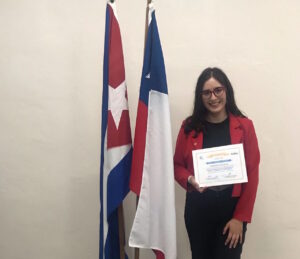
The dream of getting to know Cuba was a dream that I had since I was a teenager. As I grew older, that desire to meet a new culture got mixed with my aspirations as a teacher, and it transformed into a willingness to face the results of the impact of history itself, the revolution and its results in education. The opportunity given to me by Breaking Walls has once again changed my personal and professional life, as in the previous two experiences. They fulfilled one of my biggest dreams and allowed me to learn more about education. Thanks to Breaking Walls and the Billie Allen Memorial Sponsorship, I was able to take a two-week internship in Neuroscience at the University of Matanzas, Cuba,
Since the first day I arrived in Cuba, I felt like a time traveller. The architecture, the cars, the ways of transport, and nature, among others, made me feel like in a movie, maybe even a Ghibli movie. But you could also tell that they are living under the economic blockade. From what I was told by Cubans, they are living in the biggest crisis they have had during the last period. However, this wasn’t a negative aspect of my stay but an opportunity to observe the country’s reality.
I arrived on February 4th at La Habana and took a bus to Varadero. We had two-week classes and different excursions to learn more about Cuban culture there. But my most precious memories are related to the visits to four various educational centers. In each visit, I learned a life lesson that I will forever be grateful for.
The first place we visited was the Cuban Neuroscience Center in Cardenas; they treat children with different diagnoses and receive donations from Cubans and foreigners to help them function. While observing it, I could tell the professional’s expertise level was unreachable. They had many activities during the day, but they did a lot with little resources, which made me realize that our willingness and desire to help kids and their families is primordial for the progress in the institutions and the service. After that, we went to a Diagnostic Center that was in charge of diagnosing children of all Cardenas.’ schools, which surprised me because in Chile, every school has its own team, but they managed to care for each kid that needed it. Their motivation to care for all the kids made me realize that even in the worst scenario in school when we don’t have enough resources, we have to keep moving; otherwise, kids will be affected, and it’s okay to speak about the difficulties, and as life keeps moving so do we.
Lastly, we went to two schools where I saw something rare compared to the Chilean reality. Students were motivated to learn; they would pay attention without anyone telling them to do it and actively participated in class. But what was the difference with Chile? We have excellent teachers in Chile, but we can only achieve that with some students; we teach with love, but it’s hard to get to each kid. However, my question was answered after talking with many teachers, students, and people on the streets, and the answer was more straightforward than expected: families are very involved in children’s education. In Chile, we tend to connect poverty levels with the destruction of the family; however, even though they may have many economic difficulties in Cuba, the public policy focuses on and encourages family bonds. Besides, they are cautious, and they penalize drug use very strongly to avoid external factors that can negatively affect people and families. They know their most crucial resource is their human resources, so they take care of it, giving them health care and education as much as possible. With this experience, I realized that we as teachers can not do everything by ourselves; kids need their families to promote learning and manners, and we must work together, schools and families.
In summary, my experience in Cuba was fruitful. Getting to know their social and educational reality allowed me to recognize several positive aspects of their educational system since, despite the economic difficulties that the country is going through, their teachers, families and society as a whole are able to raise successful teaching processes.
In this sense, although we could be critical of the Cuban revolutionary process, we cannot ignore its victories, one of them being its integral and communitarian educational system, which emphasizes collaborative work and the family as the fundamental axes of the educational experience.
And once again, without the opportunity given to me by Breaking Walls and Billie Allen, I would not have had the chance to experience this and see it in person.